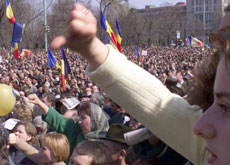
Swiss talks address failure of former Soviet states

Switzerland is hosting an international conference aimed at helping the seven poorest states of the former Soviet Union make the transition to market economies.
The Swiss finance minister, Kaspar Villiger, is to open the two-day meeting in Lucerne with an appeal for better cooperation among those states.
Villiger is expected to urge the CIS-7 (Commonwealth of Independent States) to open their borders to the goods and services of their neighbours, despite the sometimes deep political differences among them.
The states in question are: Armenia, Azerbaijan, Georgia, Kyrgyzstan, Moldova, Tajikistan and Uzbekistan.
“It is a sad fact that these countries are not trading among themselves, and that they are not really cooperating,” Giorgio Dhima from the Swiss finance ministry told swissinfo.
“If they could work together more closely and open their borders… I am sure that bilateral donors and international financial institutions would help them with supplementary loans,” he continued.
Relations between Armenia and Azerbaijan, for example, have been strained since fighting broke out after they gained independence in 1991. Although a ceasefire was signed three years later, both have suffered from their failure to resolve their differences.
Transition
The meeting is intended to draw up strategies to help the seven make the transition to market economies.
“Switzerland has a stake in this process because four of these countries are members of the Swiss grouping within the International Monetary Fund and the World Bank,” Dhima said.
He noted that Switzerland, along with several other international players in the region, underestimated the mammoth task faced by those countries into becoming democratic market economies.
“The challenges have been [numerous]: they have had to cope with a lot of problems and a huge amount of adjustment.
“They had to change their political system to a democracy and this involved a lot of institution building. Then there were economic challenges – before independence they were integrated in the Soviet Union.
“Then suddenly they were alone and they had to build up a new economic system and make the transition to a market economy.”
Poverty
Some 200 representatives from government and international organisations are attending the Lucerne conference, which seeks to address the issue of poverty which is both widespread and particularly acute in rural areas.
They will also look at ways of tackling corruption. One session will be devoted to looking at vested interests of political leaders in Tajikistan, Uzbekistan and Kyrgyzstan which are believed to be undermining economic reform.
“These political leaders very often depend on influential groups in their countries and it is difficult for them to implement reforms,” Dhima said.
Bold reforms
The biggest challenge for delegates at the conference, Dhima believes, is to convince the authorities in these countries to make bold and radical reforms.
“If you look at the Baltic countries and Poland… they had to face some very dire times but still implemented some radical reforms. Now they are bearing the fruit with economic growth of over five per cent a year and [they] are ready to join the European Union.”
The conference will also address the CIS countries’ debt burden, social policies and the development of the private sector.
The meeting was organised by the International Monetary Fund (IMF), the World Bank, the European Bank for Reconstruction and Development and the Asian Development Bank.
swissinfo, Samantha Tonkin and Scott Capper
Switzerland is hosting an international conference in Lucerne to address economic issues in Armenia, Azerbaijan, Georgia, Kyrgyzstan, Moldova, Tajikistan and Uzbekistan.
The conference is aimed at drawing up strategies for the seven poorest ex-soviet states to develop into market economies.
The Swiss finance ministry, which is attending, plans to encourage the seven states to trade more freely with their neighbours and to make bold and radical economic reforms.
Widespread poverty and corruption among governing ministers with vested interests are expected to be two of the main discussion topics.
Some 200 representatives from governments and international organisations are attending the conference.

In compliance with the JTI standards
More: SWI swissinfo.ch certified by the Journalism Trust Initiative


























You can find an overview of ongoing debates with our journalists here . Please join us!
If you want to start a conversation about a topic raised in this article or want to report factual errors, email us at english@swissinfo.ch.